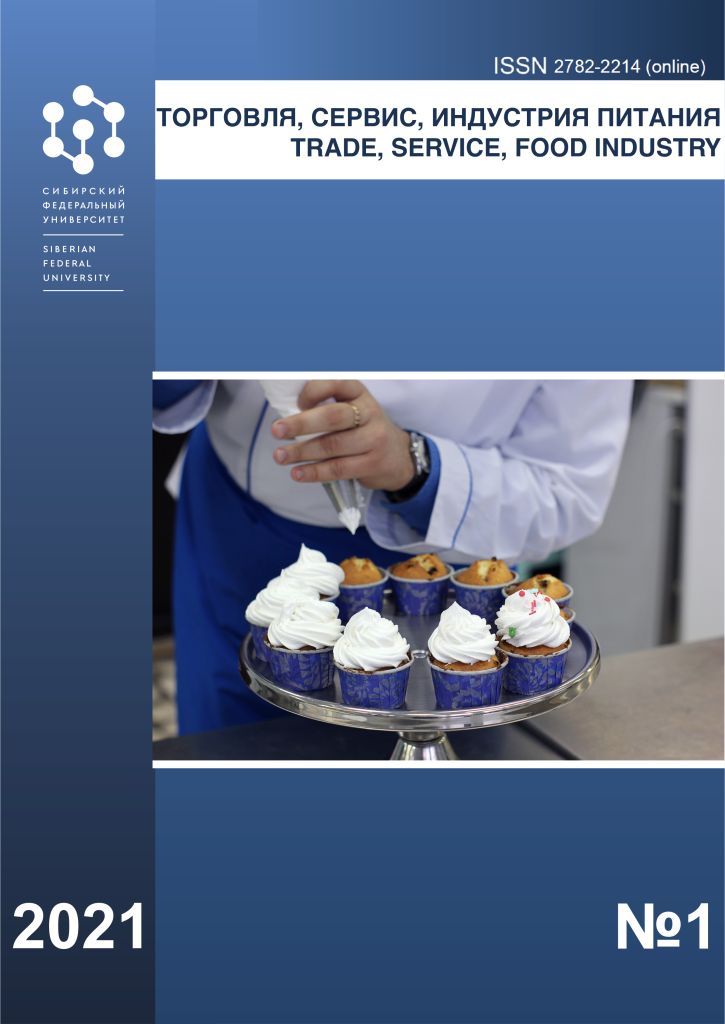Krasnoyarsk, Russian Federation
Krasnoyarsk, Russian Federation
from 01.01.1995 until now
Krasnoyarsk, Krasnoyarsk, Russian Federation
UDC 33
CSCSTI 06.52
CSCSTI 06.61
Russian Library and Bibliographic Classification 65
The article examines the issues of improving trade and food security in the Arctic territories of the region in terms of the rapid development of mining projects and processing of ores of non-ferrous metals, oil, gas transportation and the development of new logistics, including the Northern sea route and polar move. Analyzed manifested opportunities for the development of new practices of co-organization of business ecosystems integrated their use with a view to preserving traditions of indigenous peoples of the North, weak coupling areas and the high significance of the projects. The hypothesis is tested that the most successful for the development of such territories will be the formation of cooperative-network business ecosystems in relation to the goals and objectives of socio-economic development, in the cooperation of the resources of the state, business and the population. The possibilities of cooperation of digital technology resources of large corporations, the state and local communities for the implementation of new interactions for the sustainable development of territories are shown. The approaches implemented in the article can be used in research and practical projects for the development of sparsely populated, loosely connected territories of new development.
Krasnoyarsk Arctic, business ecosystems, cooperative and network interactions, integrated development of territories, territories of new development, trade
1. State Program of the Russian Federation No. 366 dated 21.04.2014 "Socio-economic development of the Arctic zone of the Russian Federation". URL: https://base.garant.ru/70644266/
2. Decree of the President of the Russian Federation of 26.10.2020 No. 645 "on The strategy for the development of the Arctic zone of the Russian Federation and ensuring national security for the period up to 2035". URL:https://www.garant.ru/products/ipo/prime/doc/74710556/
3. National action plan for the restoration of employment and incomes, economic growth and long-term structural changes in the economy (approved at the RF Government meeting on 23 September 2020 (Protocol no 36, title VII) No. P13-60855 of 02.10.2020. URL:https://www.garant.ru/products/ipo/prime/doc/74678576/
4. Order of the government of the Krasnoyarsk territory dated 26.02.2020 No. 122-R "on approval of the Strategy of socio-economic development of the Northern and Arctic territories and support of indigenous small-numbered peoples of the Krasnoyarsk territory until 2030". URL: http://docs.cntd.ru/document/570728130
5. Castels, M. (2000). Information epoch: economy, society, culture. Moscow. Higher school of Economics. 2000. 287 p.
6. Smorodinskaya, N. In. (2015). Globalized economy: from hierarchies to network structure Moscow. IE RAS. 344 p.
7. Bek, M. A., Bek, N. N. Buzulukova, E. V. et al. (2014) Methodology of research of network forms of business organization. Ed. by M. Yu. Sheresheva. Moscow. 296 p.
8. Kuimov, V. V. (2019). Economics of cooperative-network interactions. Theory. Practice. Opportunities. Moscow. INFRA-M. 220 p.
9. Smith, A. (2007). Research on the nature and causes of the wealth of peoples. Moscow. Eksmo. 960 p.
10. Schumpeter, J. (2007). Theory of economic development. Capitalism, socialism and democracy. Preface by V. S. Avtonomov. Moscow. Eksmo. 864 p.
11. Marx, K. (1958). Introduction (from economic manuscripts of 1857-1858). The complete collection of works. Vol. 12. Moscow. Politizdat. 879 p.
12. Samuelson, P. A. (1995). Ekonomika. Sevastopol. Akhtiar. 384 p.
13. Freeman, C. Perez, C. (1988). Structural Crises of Adjustment: Business Cycles and Investment Behaviour. In: Technical Change and Economic Theory. Ed. by Dosi G. et al. L. Pp. 38-66.
14. Powell, W. W. (1996). Inter-organizational Collaboration in the Biotechnology Industry. Journal of Institutional and Theoretical Economics. No 152. Pp. 197-215.
15. Chuchkevich, M. M. (1999). Fundamentals of management of network organizations. Moscow. Institute of sociology of the Russian Academy of Sciences. 37 p.
16. Phelps, E. (2015). Mass prosperity: how global innovations have become a source of jobs, new opportunities and changes. Moscow. Liberal Mission. 472 p.
17. Prigogine, I. (2003). «Is Future Given?» World Scientific Publishing Co.
18. Lipnack, J., Lindsay, S., Vrijhoef, Y. (2009). Virtual Teams: Reaching across Space, Time and Organization with Technology. Introduction. Yealth Sociology Review. Vol.18:2. Pp. 139-144.
19. Miles, R.E., Snow, C.C. (1992). Causes of failure in network organizations. California Management Review.
20. Mizruchi, M. (1994). Social Network Analysis: Recent Achievements and Current Controversies. Acta Sociologica. Vol. 37. Pp. 330-331.
21. Ricardo, D. (1955). The Beginning of political economy and taxation. Moscow. Gospolitizdat. 539 p.
22. Tyunen, I. G. (1926). The Isolated state and its relation to agriculture and national economy. Moscow. Economic life. T1. 328 p.
23. Launhardt, W. (1885). Mathemamatische Begrundung der Volkswirtschaftlehre. Leipzig. 216 p.
24. Weber, A. (1926). The Theory of industrial placement. Moscow. Book. 223 p.
25. Christaller, W. (1967). Ceneral Places in Southeerm Germany. Englewood Cliffs. NJ.
26. Lesh, A. (2007). Spatial organization of the economy. Moscow. Nauka. 663 p.
27. Izard, U. (1966). Methods of regional analysis: introduction to the science of regions. Moscow. Progress. 43 p.
28. Borts, G.H., Stein, J.I. (1964). Economic Growth in a Free Market. New York, London.
29. Siebert, H. (1969). Regional Economic Growth Theory and Policy. Scranton.
30. Friedmann, J. (1973). Urbanniszation, Planning and National Development. L. 351 p.
31. Murdal, G. (1972). Modern problems of “third world”. Drama of Asia. Moscow. Progress. 767 p.
32. Aleksandrov, I. G. (1921). Economic zoning of Russia. Moscow. Gosplan. 15 p.
33. Badman, M. K. (2014). Selected works and continuation of the beginning. Novosibirsk. 448 p.
34. Granberg, A. G. (2000). Fundamentals of regional Economics. Moscow. Higher school of Economics. 495 p.
35. Urunov, A. A. (2014). Unified and common economic space. Moscow. Synergy. 345 p.
36. Shishatsky, N. G. (2018). Prospects for the development of Northern and Arctic regions within the framework of the megaproject "Yenisei Siberia". Arctic and North. No. 33. Pp. 66-90.








